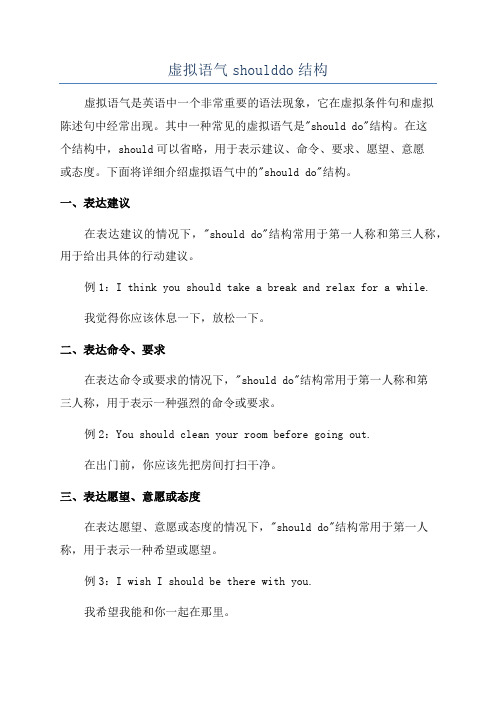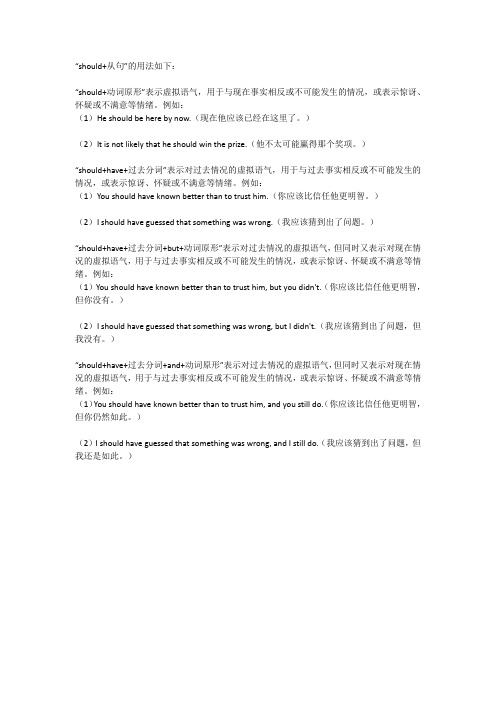虚拟语气在从句中用should的情况
虚拟语气在从句中的用法

虚拟语气在从句中的用法1.主语从句中的用法(1)在以 it 为形式主语的复合句中,虚拟语气在主语从句中表示建议、要求、命令等,谓语动词用 should be 型或 be 型虚拟式,在美国英语中常用be 型虚拟式。
如:It ’ s natural that she should do so.她这么做是很自然的事。
It is essential that we should tell her the news.我们有必要告诉她这个消息。
It is important that we should make full use of our mineral resources.对我们来说,充分利用我国的矿产资源是重要的。
It is strange that the result of the experiment should be unsatisfactory.奇怪的是实验结果竟然如此令人不满意。
It is desired that we should get everything ready by tonight.希望一切在今晚准备好。
It was arranged that Mr Sam should go and help Bettie.他们作了安排,由萨姆先生去帮助贝蒂。
(2) 主句的谓语为某些动词的被动语态,常用在It is (was) desired (suggested, settled ,proposed, recommended, requested, decided, etc.) that...句型中。
It is suggested that the question should be discussed at the next meeting.有人建议在下次会上讨论这个问题。
It is vital that he should be warned before it is too late.在还不太晚的时候警告他是非常必要的。
虚拟语气在各种从句中的应用

虚拟语⽓在各种从句中的应⽤虚拟语⽓在各种从句中的应⽤⼀.在主语从句中,⽤来表⽰惊奇、惋惜、理应如此等,其谓语形式是“(should) + 动词原形”,常⽤于下列三种句型中:1. It is necessary (vital,important, natural, strange, wonderful, proper, right, good, wrong, impossible, etc.) + that -clausee.g. It is important that we (should) master a foreign language.2. It is a pity ( a shame, no wonder, your duty, etc.) + that-clause.e.g. It is a great pity that he should be so careless.3. It is suggested (ordered, proposed, requested, etc.) + that-clause.e.g. It is requested that she should sing an English song.在上述句型的主语从句中,should意为“应该”,“竟然”,可以省去,但不可换⽤would, 主句所⽤的时态不限。
⼆.在宾语从句中1. ⽤于wish后的宾语从句中,表⽰未实⾏的活不可能实现的愿望,汉语可译为“可惜”、“......就好了”、“悔不该......”,“但愿......”等。
B.⽤法:a. 与现在相反的愿望:I wish I were ten years younger.I wish I knew how to drive a car.b. 与过去事实相反的愿望:I wish I had gone to the football match last night.I wish you had been here yesterday.c. 与将来可能相反的愿望:I wish the boys would be quiet.He wishes you would go and visit him.注:1. hope + 宾语从句(陈述语⽓),表⽰的是可能实现的愿望,⽐较:I hope it is true. I wish it were true.2. ⽤于command(命令),insist(坚持要),suggest(建议),propose(建议),order(命令)以及request(恳求),desire(希望)等之后的宾语从句中,表⽰“要求、请求、建议、命令等,其谓语形式是:“should + 动词原形”(should 可省,但不可换⽤would)。
虚拟语气完整用法

虚拟语气一、用固定的情态动词表示的虚拟语气1、 should +动词原形(有时省略should)(1)用在动词如advise, request, require, suggest, urge,demand,desire,command, insist, order, propose, recommend, 等后的宾语从句中。
例如:1)They requested that we (should) send a invitation to their school、2)He urged that he acquaint and apply the methods、2、用在it is suggested,it has been decided, it is desired, it was proposed,it is required, it was ordered, it is necessary (essential, imperative, important, desirable) that等引出的主语从句中。
例如:1)It is required that we (should) get everything done by tomorrow night、2)It is imperative that the teachers (should) have a thorough knowledge of the subject they teach、3、用在suggestion, motion, proposal, order, recommendation, plan, idea, requirement等引起的表语从句与同位语从句例如:She drives her vessel carefully lest she should lost her way、4.用在表示比拟的方式状语从句中例如:He laughed as if he had never been happier before、5.用在表示虚拟情况的定语从句中例如:It is high time you stop bitting your child、6.用在某些表示主观愿望的名词从句中例1:I wish I were as tall as you、例2:He insisted that we (should) catch up the first bus in the morning、7.用在婉转的请求、建议、批评等句子中例1:Could you hand me some pepper?例2:You might have told me earlier、例3:Hadn’t you better go and see you lover ?8.用在表示祝愿的简单句中例1:Long live world peace、例2:May you best、二.虚拟语气谓语动词的几种表现形式:1.用于虚拟条件句中虚拟条件句及其主句的谓语形式可归纳如下:从句谓语主句谓语与现在事实相反 were, did would (should, could, might) + v、与将来事实相反 should do, would (should, could, might) + v、(可能性极小) were+to+v、与过去事实相反 had done would (should, could, might) + have done例1:I could definitely see the final score if I had the time、例2:How nice it would be if you could bring a gift、例3:Thay might have arrived on time if the car haven’t broken down on the road、如果条件从句中包含有were, had, should或could,有时可把if省略掉,但这时要把were, had, should或could放在主语前面(这种结构在口语中较少使用)。
英语虚拟语气在从句中的用法及其表达方式

英语虚拟语气在从句中的用法及其表达方式摘要虚拟语气是一种特殊的动词形式,用来表示说话人所说的话不是事实,而是一种假设、愿望、怀疑、建议、猜测、可能或纯粹的空想等。
虚拟语气在英语中有多种表达方式,可以用于不同类型的从句中,如条件从句、名词性从句、状语从句、定语从句等。
本文将介绍虚拟语气在从句中的基本用法和常见句型,并给出相应的例句。
一、虚拟语气在条件从句中的用法条件从句是由连词if或其他连词引导的表示条件或假设的从句。
条件从句可以分为四种类型,分别对应不同的虚拟语气形式:类型条件从句主句含义例句真实条件if + 一般现在时一般将来时/情态动词+动词原形表示可能发生或实现的情况If it rains tomorrow, we willstay at home.与现在事实相反if + 一般过去时/过去进行时would/could/might/should+动词原形表示与现在事实相反或不可能实现的假设If I were you, I would studyharder.与过去事实相反if + 过去完成时/过去完成进行时would/could/might/should+have+过去分词表示与过去事实相反或无法改变的假设If he had studied harder, hewould have passed theexam.与将来事实相反if + should/were to+动词原形/一般过去时would/could/might/should+动词原形表示对将来不太可能发生或实现的假设If I should win the lottery, Iwould travel around theworld.二、虚拟语气在名词性从句中的用法名词性从句是指在句子中充当名词功能的从句,包括主语从句、宾语从句、表语从句和同位语从句。
名词性从句中可以使用虚拟语气来表示说话人的愿望、建议、命令、要求等。
1. 虚拟语气在宾语从句中的用法宾语从句是指在复合句中作主要成分动词或介词的宾语的从句。
宾语从句用虚拟语气的10种用法优秀

宾语从句用虚拟语气的10种用法优秀2. 建议:在宾语从句中使用"should"来表示建议。
例如:"I suggested that she should see a doctor."(我建议她去看医生。
)3. 命令:在宾语从句中使用"were to"来表示命令,相当于"should"的虚拟用法。
例如:"The boss insisted that the employees were to finish the project by Friday."(老板坚持要员工们在星期五之前完成项目。
)4. 愿望:用过去式的虚拟语气来表示对现在或将来不可能实现的愿望。
例如:"I wish I had a million dollars."(我希望我有一百万美元。
)5. 批评:使用"should"或"were to"来表达对现在或将来不可能实现的愿望。
例如:"The professor demanded that the students should study harder."(教授要求学生们要更加努力学习。
)6. 过去事实:使用过去完成时的虚拟语气来表示过去的反事实情况。
例如:"He pretended that he had never been to Paris."(他假装自己从未去过巴黎。
)7. 建议过去的行动:使用"should have"来表示对过去行动的建议。
例如:"I suggested that she should have attended the meeting."(我建议她应该参加会议。
)8. 不可实现的要求:使用"could"来表示对过去行动的不可实现的要求。
虚拟语气shoulddo结构

虚拟语气shoulddo结构虚拟语气是英语中一个非常重要的语法现象,它在虚拟条件句和虚拟陈述句中经常出现。
其中一种常见的虚拟语气是"should do"结构。
在这个结构中,should可以省略,用于表示建议、命令、要求、愿望、意愿或态度。
下面将详细介绍虚拟语气中的"should do"结构。
一、表达建议在表达建议的情况下,"should do"结构常用于第一人称和第三人称,用于给出具体的行动建议。
例1:I think you should take a break and relax for a while.我觉得你应该休息一下,放松一下。
二、表达命令、要求在表达命令或要求的情况下,"should do"结构常用于第一人称和第三人称,用于表示一种强烈的命令或要求。
例2:You should clean your room before going out.在出门前,你应该先把房间打扫干净。
三、表达愿望、意愿或态度在表达愿望、意愿或态度的情况下,"should do"结构常用于第一人称,用于表示一种希望或愿望。
例3:I wish I should be there with you.我希望我能和你一起在那里。
四、虚拟条件句在虚拟条件句中,"should do"结构常用于if从句中,表示一种假设、猜测或推测。
例4:If I were you, I should take the job offer.如果我是你,我应该接受这份工作。
以上是关于虚拟语气中的"should do"结构的介绍,该结构在日常英语中使用非常频繁,用于表示建议、命令、要求、愿望、意愿或态度。
熟练掌握该结构的用法对于提升英语口语表达能力非常有帮助。
should+从句的用法

“should+从句”的用法如下:“should+动词原形”表示虚拟语气,用于与现在事实相反或不可能发生的情况,或表示惊讶、怀疑或不满意等情绪。
例如:(1)He should be here by now.(现在他应该已经在这里了。
)(2)It is not likely that he should win the prize.(他不太可能赢得那个奖项。
)“should+have+过去分词”表示对过去情况的虚拟语气,用于与过去事实相反或不可能发生的情况,或表示惊讶、怀疑或不满意等情绪。
例如:(1)You should have known better than to trust him.(你应该比信任他更明智。
)(2)I should have guessed that something was wrong.(我应该猜到出了问题。
)“should+have+过去分词+but+动词原形”表示对过去情况的虚拟语气,但同时又表示对现在情况的虚拟语气,用于与过去事实相反或不可能发生的情况,或表示惊讶、怀疑或不满意等情绪。
例如:(1)You should have known better than to trust him, but you didn't.(你应该比信任他更明智,但你没有。
)(2)I should have guessed that something was wrong, but I didn't.(我应该猜到出了问题,但我没有。
)“should+have+过去分词+and+动词原形”表示对过去情况的虚拟语气,但同时又表示对现在情况的虚拟语气,用于与过去事实相反或不可能发生的情况,或表示惊讶、怀疑或不满意等情绪。
例如:(1)You should have known better than to trust him, and you still do.(你应该比信任他更明智,但你仍然如此。
宾语从句中的虚拟语气使用

宾语从句中的虚拟语气使用在宾语从句中,如果宾语从句所表达的内容与事实相反或与主句中的动词形态相矛盾时,可以使用虚拟语气。
虚拟语气在宾语从句中的用法如下:1. 要求、建议、命令、感叹等动词后的宾语从句中,虚拟语气使用"should + 动词原形"的形式。
例句:- She insisted that he should go to the party.(她坚持要他去参加派对。
)- He requested that the meeting should be postponed.(他要求会议应该被推迟。
)- It is important that we should study hard.(重要的是我们应该努力学习。
)2.在一些特定的动词后的宾语从句中,虚拟语气使用"动词原形(与过去形式相同)"的形式。
例句:- I suggest that they try again.(我建议他们再试一次。
)3. 在条件句中的宾语从句中,虚拟语气使用"would/should/could/might + 动词原形"的形式。
例句:- If he were here, he would help us.(如果他在这里的话,他会帮助我们。
)- If I had more money, I would buy a car.(如果我有更多的钱,我会买一辆车。
)- If it were to rain tomorrow, we would stay at home.(如果明天下雨,我们会呆在家里。
)需要注意的是,虚拟语气的使用方法因语境和时态的不同而有所不同,以上仅是一些常见的使用情况。
因此,在具体的语境中,应根据需要确定正确的虚拟语气形式。
- 1、下载文档前请自行甄别文档内容的完整性,平台不提供额外的编辑、内容补充、找答案等附加服务。
- 2、"仅部分预览"的文档,不可在线预览部分如存在完整性等问题,可反馈申请退款(可完整预览的文档不适用该条件!)。
- 3、如文档侵犯您的权益,请联系客服反馈,我们会尽快为您处理(人工客服工作时间:9:00-18:30)。
虚拟语气在从句中用should的情况
1. 在建议、要求、命令、想法后的动词后的宾语从句里, 用should + 动词原形, should 可以省略. 如advise, agree, command, decide, demand, determine, indicate, insist, order, propose, request, require, suggest, urge.
The doctor suggested that she (should) take good care of herself. 2. 在建议,要求,命令,想法后的名词后的从句里, 用should + 动词原形, should可以省略. 如
advice, agreement, command, decision, demand, determination, indication, insistence, order, preference, proposal, request, requirement etc.
It was Bill’s suggestion that everyone (s hould) have a map. (主语3. 在It is/was +形容词后that引起的主语从句中用should的结构, should 可以省略。
这类形容词常见的有: advisable, anxious, compulsory, crucial, desirable, eager, essential, impossible, improper, important, natural, necessary, obligatory, possible, preferable, probable, recommended, urgent, vital; strange, surprising, unnatural,etc.
It's natural that she (should) do so.
It is important that we (should) learn English well.
4. 在It’s (about)/(high)time 后的that 从句中, 用过去式, 有时也可用should + do 的形式表示“该是做什么的时候” should不能
省略。
It is about time you were in bed.
It is high time we left(should leave).。
